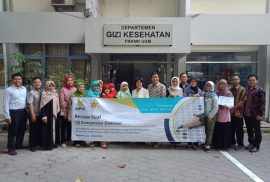Strengthening the Family Assistance Team (TPK) with the theme concept “Stunting Prevention as an Effort to Reduce the Risk of Stunting in Special Region of Yogyakarta”

The Department of Nutrition and Health, Faculty of Medicine Public Health and Nursing UGM together with the Center for Health and Human Nutrition (PKGM) FKKMK UGM, DPD PERGIZI PANGAN DI Yogyakarta, Dr. Sardjito General Hospital, and the National Research and Innovation Agency of Republic of Indonesia (BRIN) have held a Family Assistance Team Strengthening Activity (TPK) with the theme concept titled “Stunting Prevention As an Effort to Reduce the Risk of Stunting in Special Region of Yogyakarta” on Wednesday, 12 July 2023 at 10.00 – 12.00 WIB which took place at the Sendowo Padukuhan Hall, Sinduadi, Mlati, Sleman.























